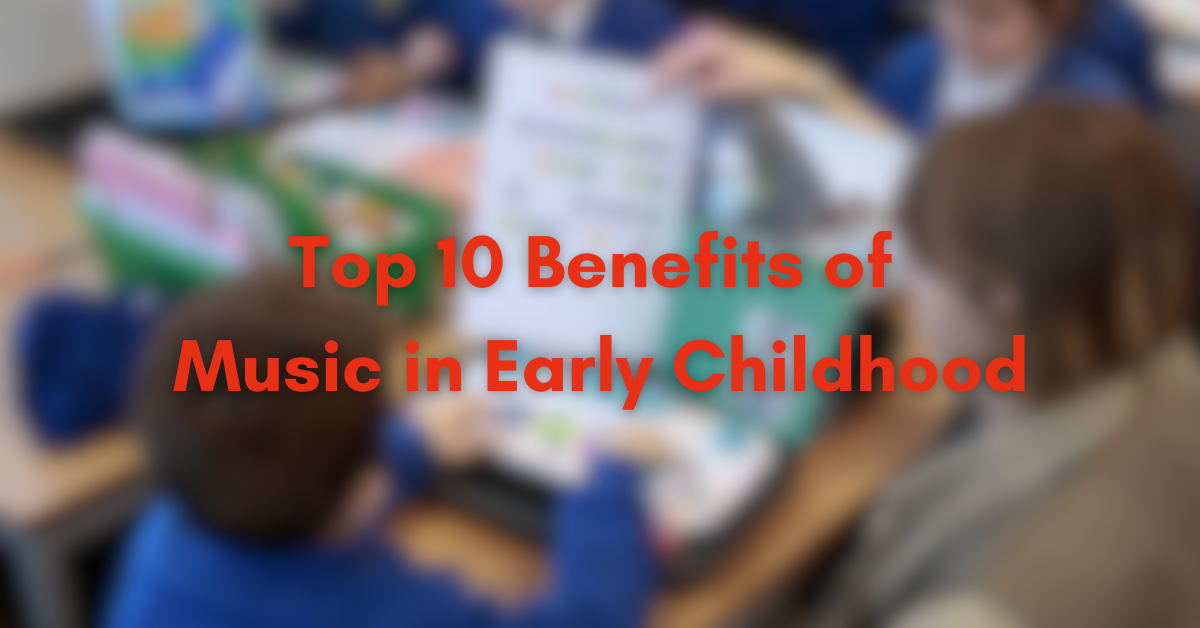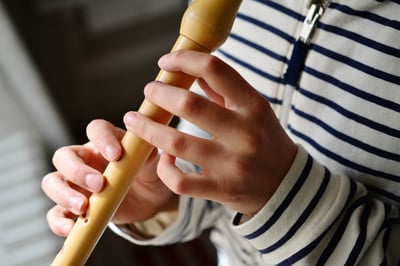Top 10 Benefits of Music in Early Childhood
June 9th, 2023
4 min read

Music shapes the early experiences of children. We sing lullabies to our babies and we teach our children the basics of counting and even the alphabet with simple songs.
These experiences are fun, they are comforting, but they can also be influential on a child's development.
Studies have shown that exposure to music at a young age can lead to increased IQ, improved language skills, and improved test skills.
At Warwick Music, we have experienced the many benefits of music throughout our lives. Our passion for music has been shared with our own families and it has helped us create our award-winning instruments for beginners.
We also understand that music can feel a little intimidating for those who do not play themselves. There are so many different instruments to choose from, and that's without factoring in the cost of an instrument and lessons. Will investing this time and money into music be worth it?
Let's take a look at ten key benefits of introducing your child to music...
Language and Literacy Skills
Early exposure to music has been shown to enhance language development, improving vocabulary, comprehension, and reading skills. Singing is particularly beneficial for communication while rhyming activities promote early literacy.
Best of all, many of these activities can be introduced by parents and carers who are non-musical. Encouraging children to express themselves through nursery rhymes can make a big difference in early language and literacy skills. And as children get older, music continues to introduce new vocabulary and concepts.
Music can even become its own form of communication and expression. In this video, Grammy-winning bassist Victor Wooten explores the way that we can communicate with music:
Motor Skills
Whether it is playing beginner instruments - such as the recorder, percussion, or xylophone - or even clapping to the beat, music enhances fine motor skills and coordination. Think of the skills required to hold, strum, pick, and pluck a ukulele.
Music can also support the development of gross motor skills through dancing and movement.
Cognitive Development
Music engages multiple areas of the brain, stimulating memory, attention, and problem-solving skills. In fact, a study by neuroscientists at USC has demonstrated that music education can accelerate brain development in young children. Music enhances spatial-temporal skills, language processing, and even mathematical abilities.
These benefits extend to babies and infants. This UNICEF video explains how sounds and music can impact your baby's cognitive development:
Emotional Expression
Many of us listen to music when we are celebrating success. We also turn on our favourite tunes when we need a pick-me-up. Music can help us express our emotions, and for young children, this is a vital outlet. At a young age, we are still developing emotional intelligence and self-awareness. Singing songs or playing an instrument can be a great way for children to experiment with this expression.
Much like adults, music can also regulate emotions in children. Listening to ambient sounds can promote relaxation. Playing an instrument can boost their mood, or even reduce stress. So cut down on those tantrums and sing a song instead!
Social Skills
Music is a wonderful way for children to develop and improve their social interaction. Many children's play groups, and later their school activities, revolve around music. It promotes collaboration and teamwork, creating sounds together. Music breaks down barriers and encourages children to explore social interaction and find new ways of communicating.
Children learn to listen, cooperate, and communicate effectively when making music with others. This fosters empathy and forges social bonds. Music allows children to practise these vital skills from a young age.
Cultural Appreciation
Discovering the context behind music can teach children so much about the world around them. Exploring music from different cultures exposes children to traditions from around the world, creating cultural awareness, respect, and an appreciation for diversity.
Experiencing the music and stories of other people is a fantastic educational exercise, and gives children a gateway into new thoughts and ideas. And it does so in a fun, accessible way!
Music can even be used to help with educating children, like this fun video about Ancient Egypt for kids below:
Creativity and Imagination
This feels like an obvious benefit. After all, music is all about creative expression. But giving children creative outlets is so rewarding, and music provides so many options to think creatively and express themselves through sound.
Children can use their imagination and experiment with sounds, melodies, and lyrics. Music allows for improvisation and innovation and could bring out a whole new side in your little one.
Self-Confidence and Self-Esteem
How many times have we watched a performer stand on stage, belt out a song, and thought "I couldn't do that"? Giving children an early exposure to musical activities can boost their confidence and self-esteem. Positive feedback from performances, along with the musical milestones that come with learning an instrument can help to give children the drive to continue with their learning.
Discipline and Focus
Learning to play a musical instrument is tough. It requires discipline, practice, and concentration. These might sound like scary words for parents of young children, but encouraging your child to engage in musical practice can bring benefits in later life. Regular musical training can improve a child's attention span, focus and self-discipline.
These skills are particularly useful when children enter an educational setting. Children who have learned to play an instrument will be better equipped to keep their concentration in class.
Brain Development and Long-Term Benefits
Encouraging your child to engage with music can bring a host of long-term health benefits. Research suggests that musical training in childhood can lead to long-lasting changes in brain structure and function. It has been associated with enhanced cognitive abilities, academic performance, and even improved overall brain health in later life.

These are just a handful of the benefits that music can bring to children as they grow.
- Looking for a beginner instrument? The recorder is a popular choice, so read our article looking at the most popular model for children.
- Find out more about pCorder, the world's first carbon-neutral, antimicrobial recorder, with our quick start guide
- There are so many benefits to brass instruments, and some are easy to play for young children. Here are five top picks that are perfect for beginners.
Adam is the Content Manager at pBone Music. This should mean that he’s the ideal person to write about himself, but he finds boasting in the third person a little awkward. He honed his word wizardry with a degree in English Language and Literature at the University of Leeds. He has since written copy for clients and businesses across the land, from awards to something beginning with “z”. He also spent a number of years as a musician. He has written pop songs and even jingles for kids, performed more first dances at weddings than you could shake a pBuzz at, and once played a gig for a pie company at The Etihad Stadium in Manchester. When he’s not reminiscing about those good old days, you might find Adam enjoying the football (although as an Everton fan, that can be difficult). He also loves spending time with his partner, Jen, and his family and friends, and sincerely hopes they feel the same way.
Topics: